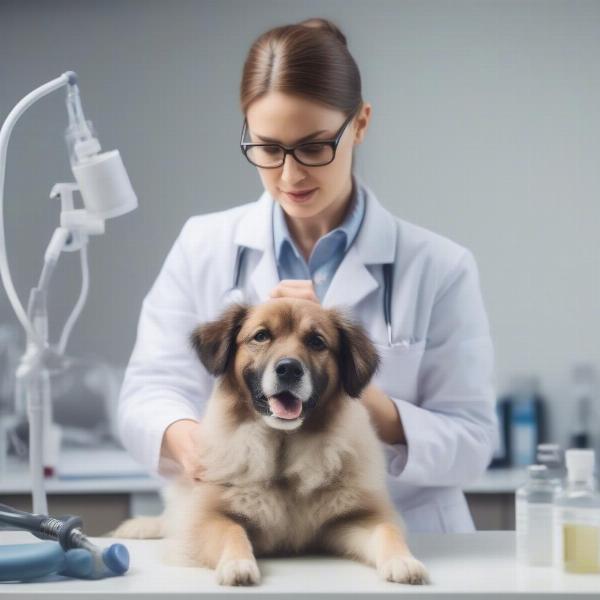Okra, also known as lady’s finger, is a popular vegetable in many cuisines around the world. But can your furry friend enjoy this nutritious veggie too? The short answer is yes, dogs can eat okra, but with some important caveats. Understanding how to prepare and serve okra safely is crucial to ensure your dog receives its benefits without any potential risks.
Okra for Dogs: Nutritional Benefits and Risks
Okra is packed with vitamins and minerals, including vitamins A, C, K, and B6, as well as folate, magnesium, and potassium. It’s also a good source of fiber, which can aid in digestion. However, introducing okra to your dog’s diet needs careful consideration.
While generally safe, okra’s slimy texture can be a choking hazard, especially for smaller breeds. Always cut okra into small, manageable pieces to prevent choking. Furthermore, okra contains solanine, which can be toxic in large amounts. While the levels in okra are generally low, overconsumption could lead to digestive upset.
Serving Okra to Your Dog: The Right Way
The best way to serve okra to your dog is cooked and plain. Avoid frying or adding seasonings like salt, pepper, or garlic, which can be harmful to dogs. Steaming, boiling, or baking okra until tender is the safest approach.
Start by offering a small amount of cooked okra to see how your dog reacts. Monitor for any signs of digestive issues, like vomiting or diarrhea. If your dog tolerates it well, you can gradually increase the amount. Remember, moderation is key. Okra should be an occasional treat, not a staple in your dog’s diet.
Is Okra Good for All Dogs?
While most dogs can enjoy okra in moderation, some dogs might have specific dietary restrictions or sensitivities. If your dog has any pre-existing health conditions, consult your veterinarian before introducing okra or any new food into their diet. They can advise you on whether okra is a suitable addition and recommend safe serving sizes.
 Veterinarian Examining a Dog
Veterinarian Examining a Dog
Okra and Digestive Health in Dogs
Okra’s fiber content can be beneficial for dogs experiencing constipation. The fiber adds bulk to the stool, promoting regular bowel movements. However, too much fiber can have the opposite effect, causing diarrhea. Therefore, it’s essential to monitor your dog’s reaction and adjust the serving size accordingly.
Conclusion
Can a dog eat okra? Absolutely, as long as it’s prepared correctly and offered in moderation. Cooked, plain okra can offer nutritional benefits, but be mindful of potential choking hazards and the need for moderation, especially for dogs with existing health issues. Always consult your vet before making significant changes to your dog’s diet.
FAQ
- Can puppies eat okra? It’s best to wait until your puppy is a bit older and their digestive system is more developed before introducing okra. Consult with your vet for guidance.
- What are the signs of okra allergy in dogs? Look for symptoms like itching, redness, swelling, vomiting, or diarrhea. Contact your vet immediately if you notice any of these signs.
- Can dogs eat raw okra? While not inherently toxic, raw okra can be difficult to digest and presents a greater choking hazard. It’s always recommended to cook okra before giving it to your dog.
- How much okra can I give my dog? Start with a small amount and monitor your dog’s reaction. A few small pieces are usually enough.
- Can okra replace dog food? No, okra should be a treat, not a meal replacement. A balanced dog food should be the foundation of your dog’s diet.
- Can dogs eat pickled okra? No, pickled okra is high in sodium and other seasonings that are harmful to dogs.
- Can I give my dog okra every day? It’s best to offer okra occasionally rather than daily to avoid potential digestive issues.
Related Articles (If available, add links to relevant articles on the website)
About ILM Dog
ILM Dog is your trusted source for expert advice on dog care and nutrition. We offer valuable insights on dog breeds, health, training, and much more. From choosing the right breed to providing the best nutrition, ILM Dog is here to help you every step of the way. We specialize in providing information on breed selection, health and medical care, training and behavior, as well as nutrition and feeding. For any questions, contact us at [email protected] or +44 20-3965-8624.